Unit 1 How can we become good learners. Section B 1a-1e 课件(共26张PPT)2022-2023学年人教版英语九年级全册
文档属性
| 名称 | Unit 1 How can we become good learners. Section B 1a-1e 课件(共26张PPT)2022-2023学年人教版英语九年级全册 | 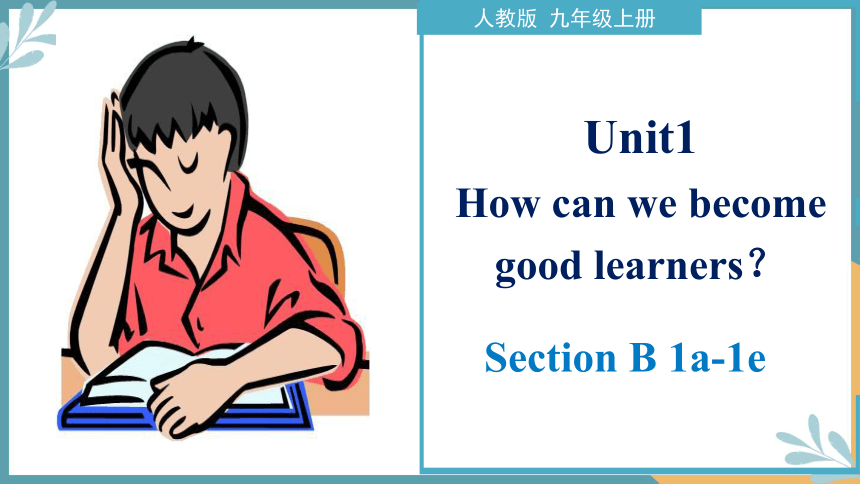 | |
| 格式 | pptx | ||
| 文件大小 | 3.8MB | ||
| 资源类型 | 教案 | ||
| 版本资源 | 人教新目标(Go for it)版 | ||
| 科目 | 英语 | ||
| 更新时间 | 2023-07-02 21:45:11 | ||
图片预览

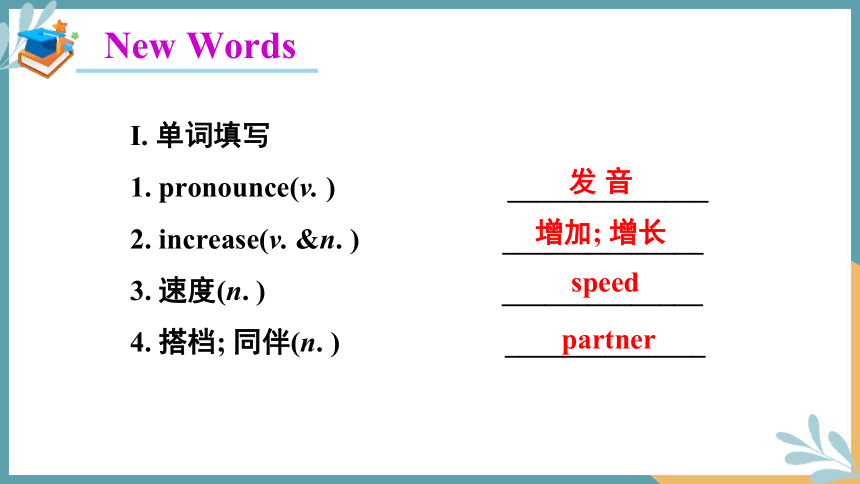
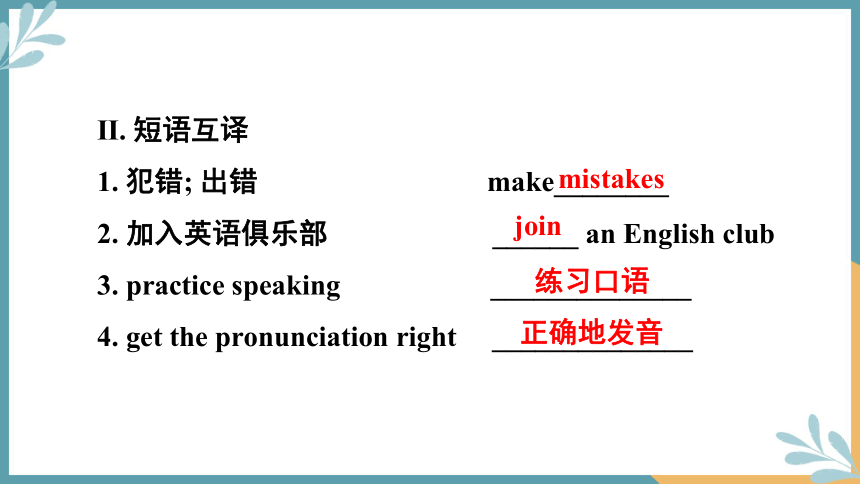
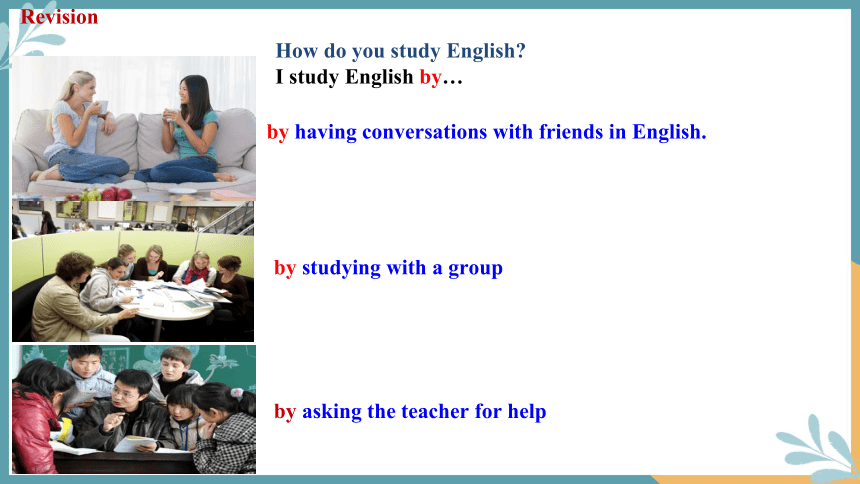
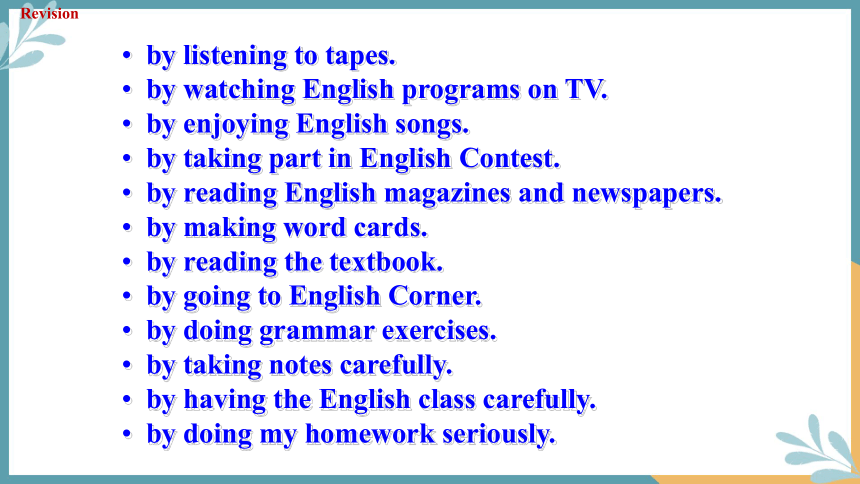
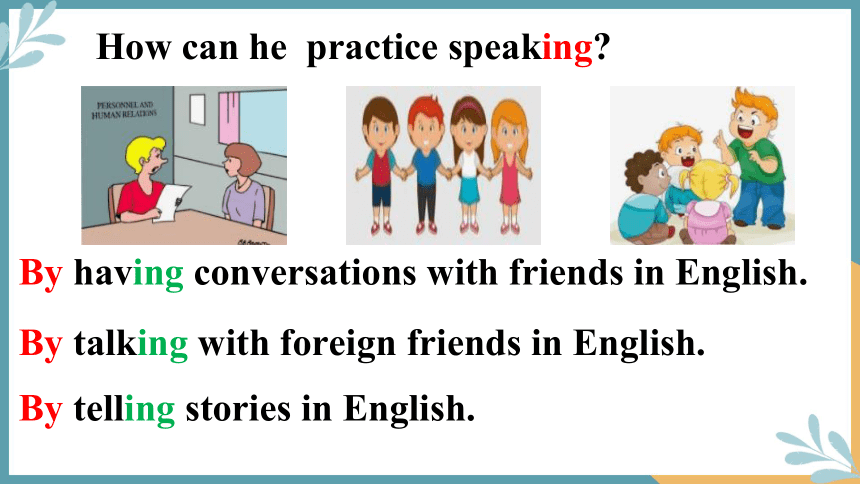

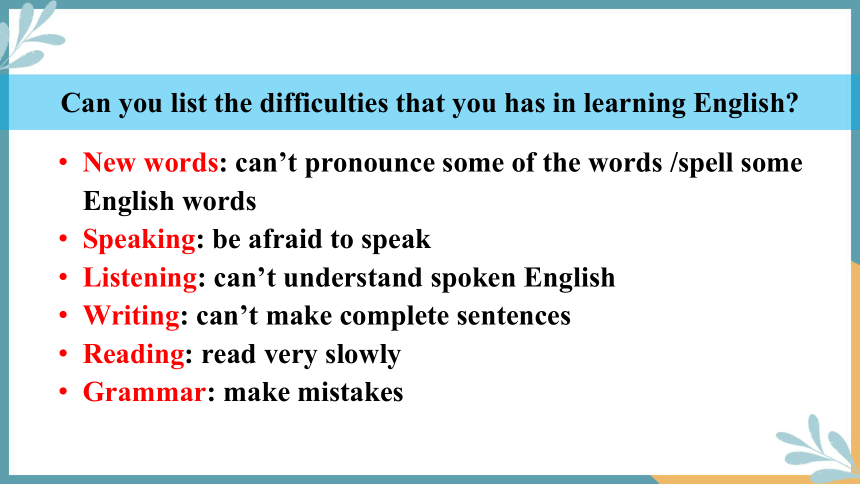
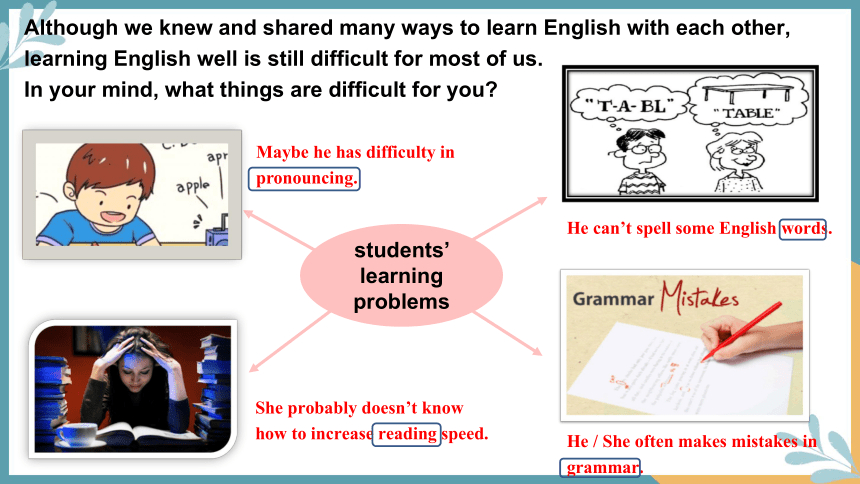
文档简介
(共26张PPT)
人教版 九年级上册
Section B 1a-1e
Unit1
How can we become good learners?
New Words
Ⅰ. 单词填写
1. pronounce(v. ) ______________
2. increase(v. &n. ) ______________
3. 速度(n. ) ______________
4. 搭档; 同伴(n. ) ______________
发 音
增加; 增长
speed
partner
Ⅱ. 短语互译
1. 犯错; 出错 make________
2. 加入英语俱乐部 ______ an English club
3. practice speaking ______________
4. get the pronunciation right ______________
mistakes
join
练习口语
正确地发音
by asking the teacher for help
by studying with a group
by having conversations with friends in English.
Revision
How do you study English
I study English by…
by listening to tapes.
by watching English programs on TV.
by enjoying English songs.
by taking part in English Contest.
by reading English magazines and newspapers.
by making word cards.
by reading the textbook.
by going to English Corner.
by doing grammar exercises.
by taking notes carefully.
by having the English class carefully.
by doing my homework seriously.
Revision
How can he practice speaking
By having conversations with friends in English.
By talking with foreign friends in English.
By telling stories in English.
What’s your problems in learning English
How do you solve them
Lead-in
Can you list the difficulties that you has in learning English
New words: can’t pronounce some of the words /spell some English words
Speaking: be afraid to speak
Listening: can’t understand spoken English
Writing: can’t make complete sentences
Reading: read very slowly
Grammar: make mistakes
Although we knew and shared many ways to learn English with each other, learning English well is still difficult for most of us.
In your mind, what things are difficult for you
students’ learning problems
Maybe he has difficulty in pronouncing.
She probably doesn’t know how to increase reading speed.
He can’t spell some English words.
He / She often makes mistakes in grammar.
I can't pronounce some of the words.
I can't always understand spoken English.
I don't know how to increase my reading speed.
I can't spell some English words.
I often make mistakes in grammar.
Read the list, tell me which statements are true for you.
1a
Read the list. Check (√) the statements that are true for u.
____ I can’t pronounce some of the words.
____ I can’t always understand spoken English.
____ I don’t know how to increase my reading speed.
____ I can’t spell some English words.
____ I often make mistakes in grammar.
v. 发音
v. 增加;增长
n. 速度
1a
1b What other things are difficult for you Make a list.
1. I don’t know enough words to write well.
2. ___________________________________
3. ___________________________________
4. ___________________________________
___________________________________
I’m nervous when I try to speak English.
I can’t understand English movies.
I don’t understand native speakers of English.
1c Paul finds it difficult to learn English.
Listen and complete the learning challenges he talks about.
Challenges
1. He can’t get the _____________ right.
2. He ________ a lot of new words.
3. He can’t always __________ when people
talk to him.
4. He doesn’t get much ________ practice.
pronunciation
forgets
understand
writing
Listening
T: You look ___ , Paul. B: I am, Ms Manson. I’m having trouble ______ English.
T: You said you liked English. What’s the problem B: I can’t get the ________ right.
T: Well, _________ can help. Why don’t you listen to English songs on the radio and
________ the difficult words
B: That’s a good idea. But what about the new words I forget a lot of new words.
T: You can always write the new words in your notebook and study them at home.
You can even study on the ___ on the way to school. B: That might really help! Thanks.
T: Can you _________ when people talk to you
B: Well, not always. ________ I just don’t understand what people are saying.
T: Why don’t you join an English _______ club to practice speaking English
The English club ______ after school on Tuesdays and Thursdays.
B: Maybe I’ll go. The only other problem I have is that I don’t get much _______practice.
T: Maybe you should find a pen pal.
B: That sounds like a fun way to practice writing. Thanks, Ms Manson.
Listen to the tape and fill in the blanks.
worried
learning
pronunciation
helping
repeat
subway
understand
Sometimes
language
meets
writing
Post-listening
Task 1
1d Listen again. Complete the solutions.
Solutions
1. _________ can help.
2. He can always ___________________ in his
notebook and study them at home.
3. He can __________________________ to
practice speaking.
4. He should find a _______ to practice writing.
Listening
write the new words
join an English language club
pen pal
Challenges
He can’t get the pronunciation right.
He forgets a lot of new words.
He can’t always understand when people talk to him.
He doesn’t get much writing practice.
Solutions
Listening can help.
He can always write the new words in his notebook and study them at home.
He can join an English language club to practice speaking.
D. He should find a pen pal to
practice writing.
Match the challenges to the solutions.
1e Role-play conversations using the
information in 1c and 1d.
①
A: I don’t have a partner to practice
English with.
B: Maybe you should join an English club.
②
A: I always forget the new words.
B: You can write the new words in your
notebook and study them at home.
He made mistakes in grammar.
Presentation
What mistakes did he/she make
花,FLOER?
Having a discussion
You’re wrong. F-L-O-W-E-R
She can’t spell some English words.
You is my life.
You is my life.
make mistakes 犯错; 出错; 表示在某一方面出错时, 常与介词in搭配。
Why doesn’t the teacher use any
Having a discussion about other difficulties in learning English
Presentation
don’t know how to increase my reading speed
can’t understand spoken English
【句型剖析】 “疑问词+不定式”结构的用法
(1)构成: “疑问词+不定式”结构是英语中常用的一种结构。疑问词是指疑问代词“who, whom, what, which, whose”和疑问副词“when, where, how”等。
(2)作用: 这种结构在句中常作主语、宾语和表语。
(3)可跟此结构作宾语的常见动词有tell, know, decide, show, ask, explain, learn等。
D
当别人遇到困难,你给别人提建议时,可以用哪些句型?
Why don’t you …
Why not …
Maybe you should …
You can/could …
What about/How about …
can’t pronounce some of the words/ understand spoken English.
how to increase my reading speed./ can’t spell some English words.
make mistakes in grammar…/ can’t get the pronunciation right.
can’t remember a lot of words. / get much writing to practice…
Why don’t you … /Why not …
Maybe you should … / You can/could …
What about/How about …
Summary
Difficulties in learning English.
Solutions — 建议句型
一、用所给词的适当形式填空。
Sometimes, I can’t get the_____________ (pronounce) right.
I don’t know how_________ (improve) my spoken English.
The more careful you are, the fewer_________ (mistake) you’ll make.
You can find a pen pal to practice________ (write).
She can’t______ (spell) English words. She often forgets a lot of new words.
Exercise
pronunciation
to improve
mistakes
writing
spell
二、用方框中所给单词的适当形式填空。
We must learn to face the __________ in our life.
2. He has trouble understanding _______ English.
3. Can you think of a good _______ to the problem
4. You can listen to the tapes to get much listening _______.
5. The more careful you are, the fewer ________ you’ll make.
solution, practice, mistake, spoken, challenges
challenges
spoken
solution
practice
mistakes
IV用方框中所给单词的适当形式填空。
We must learn to face the __________ in our life.
2. He has trouble understanding _______ English.
3. Can you think of a good _______ to the problem
4. You can listen to the tapes to get much listening _______.
5. The more careful you are, the fewer _______ you’ll make.
solution, practice, mistake, spoken, challenges
challenges
spoken
solution
practice
mistakes
Summary
1. pronounce some of the words 拼读一些单词
2. understand spoken English 懂得口语
3. increase my reading speed 提高我的阅读速度
4. spell some English words 拼写一些英语单词
5. make mistakes in grammar 语法方面出错误
6. have a partner to practice English with 有伙伴一起练习英语
7. join an English club 加入英语俱乐部
1.Remember the new words and phrases by heart.
2.Try to speak English as much as possible.
Homework
人教版 九年级上册
Section B 1a-1e
Unit1
How can we become good learners?
New Words
Ⅰ. 单词填写
1. pronounce(v. ) ______________
2. increase(v. &n. ) ______________
3. 速度(n. ) ______________
4. 搭档; 同伴(n. ) ______________
发 音
增加; 增长
speed
partner
Ⅱ. 短语互译
1. 犯错; 出错 make________
2. 加入英语俱乐部 ______ an English club
3. practice speaking ______________
4. get the pronunciation right ______________
mistakes
join
练习口语
正确地发音
by asking the teacher for help
by studying with a group
by having conversations with friends in English.
Revision
How do you study English
I study English by…
by listening to tapes.
by watching English programs on TV.
by enjoying English songs.
by taking part in English Contest.
by reading English magazines and newspapers.
by making word cards.
by reading the textbook.
by going to English Corner.
by doing grammar exercises.
by taking notes carefully.
by having the English class carefully.
by doing my homework seriously.
Revision
How can he practice speaking
By having conversations with friends in English.
By talking with foreign friends in English.
By telling stories in English.
What’s your problems in learning English
How do you solve them
Lead-in
Can you list the difficulties that you has in learning English
New words: can’t pronounce some of the words /spell some English words
Speaking: be afraid to speak
Listening: can’t understand spoken English
Writing: can’t make complete sentences
Reading: read very slowly
Grammar: make mistakes
Although we knew and shared many ways to learn English with each other, learning English well is still difficult for most of us.
In your mind, what things are difficult for you
students’ learning problems
Maybe he has difficulty in pronouncing.
She probably doesn’t know how to increase reading speed.
He can’t spell some English words.
He / She often makes mistakes in grammar.
I can't pronounce some of the words.
I can't always understand spoken English.
I don't know how to increase my reading speed.
I can't spell some English words.
I often make mistakes in grammar.
Read the list, tell me which statements are true for you.
1a
Read the list. Check (√) the statements that are true for u.
____ I can’t pronounce some of the words.
____ I can’t always understand spoken English.
____ I don’t know how to increase my reading speed.
____ I can’t spell some English words.
____ I often make mistakes in grammar.
v. 发音
v. 增加;增长
n. 速度
1a
1b What other things are difficult for you Make a list.
1. I don’t know enough words to write well.
2. ___________________________________
3. ___________________________________
4. ___________________________________
___________________________________
I’m nervous when I try to speak English.
I can’t understand English movies.
I don’t understand native speakers of English.
1c Paul finds it difficult to learn English.
Listen and complete the learning challenges he talks about.
Challenges
1. He can’t get the _____________ right.
2. He ________ a lot of new words.
3. He can’t always __________ when people
talk to him.
4. He doesn’t get much ________ practice.
pronunciation
forgets
understand
writing
Listening
T: You look ___ , Paul. B: I am, Ms Manson. I’m having trouble ______ English.
T: You said you liked English. What’s the problem B: I can’t get the ________ right.
T: Well, _________ can help. Why don’t you listen to English songs on the radio and
________ the difficult words
B: That’s a good idea. But what about the new words I forget a lot of new words.
T: You can always write the new words in your notebook and study them at home.
You can even study on the ___ on the way to school. B: That might really help! Thanks.
T: Can you _________ when people talk to you
B: Well, not always. ________ I just don’t understand what people are saying.
T: Why don’t you join an English _______ club to practice speaking English
The English club ______ after school on Tuesdays and Thursdays.
B: Maybe I’ll go. The only other problem I have is that I don’t get much _______practice.
T: Maybe you should find a pen pal.
B: That sounds like a fun way to practice writing. Thanks, Ms Manson.
Listen to the tape and fill in the blanks.
worried
learning
pronunciation
helping
repeat
subway
understand
Sometimes
language
meets
writing
Post-listening
Task 1
1d Listen again. Complete the solutions.
Solutions
1. _________ can help.
2. He can always ___________________ in his
notebook and study them at home.
3. He can __________________________ to
practice speaking.
4. He should find a _______ to practice writing.
Listening
write the new words
join an English language club
pen pal
Challenges
He can’t get the pronunciation right.
He forgets a lot of new words.
He can’t always understand when people talk to him.
He doesn’t get much writing practice.
Solutions
Listening can help.
He can always write the new words in his notebook and study them at home.
He can join an English language club to practice speaking.
D. He should find a pen pal to
practice writing.
Match the challenges to the solutions.
1e Role-play conversations using the
information in 1c and 1d.
①
A: I don’t have a partner to practice
English with.
B: Maybe you should join an English club.
②
A: I always forget the new words.
B: You can write the new words in your
notebook and study them at home.
He made mistakes in grammar.
Presentation
What mistakes did he/she make
花,FLOER?
Having a discussion
You’re wrong. F-L-O-W-E-R
She can’t spell some English words.
You is my life.
You is my life.
make mistakes 犯错; 出错; 表示在某一方面出错时, 常与介词in搭配。
Why doesn’t the teacher use any
Having a discussion about other difficulties in learning English
Presentation
don’t know how to increase my reading speed
can’t understand spoken English
【句型剖析】 “疑问词+不定式”结构的用法
(1)构成: “疑问词+不定式”结构是英语中常用的一种结构。疑问词是指疑问代词“who, whom, what, which, whose”和疑问副词“when, where, how”等。
(2)作用: 这种结构在句中常作主语、宾语和表语。
(3)可跟此结构作宾语的常见动词有tell, know, decide, show, ask, explain, learn等。
D
当别人遇到困难,你给别人提建议时,可以用哪些句型?
Why don’t you …
Why not …
Maybe you should …
You can/could …
What about/How about …
can’t pronounce some of the words/ understand spoken English.
how to increase my reading speed./ can’t spell some English words.
make mistakes in grammar…/ can’t get the pronunciation right.
can’t remember a lot of words. / get much writing to practice…
Why don’t you … /Why not …
Maybe you should … / You can/could …
What about/How about …
Summary
Difficulties in learning English.
Solutions — 建议句型
一、用所给词的适当形式填空。
Sometimes, I can’t get the_____________ (pronounce) right.
I don’t know how_________ (improve) my spoken English.
The more careful you are, the fewer_________ (mistake) you’ll make.
You can find a pen pal to practice________ (write).
She can’t______ (spell) English words. She often forgets a lot of new words.
Exercise
pronunciation
to improve
mistakes
writing
spell
二、用方框中所给单词的适当形式填空。
We must learn to face the __________ in our life.
2. He has trouble understanding _______ English.
3. Can you think of a good _______ to the problem
4. You can listen to the tapes to get much listening _______.
5. The more careful you are, the fewer ________ you’ll make.
solution, practice, mistake, spoken, challenges
challenges
spoken
solution
practice
mistakes
IV用方框中所给单词的适当形式填空。
We must learn to face the __________ in our life.
2. He has trouble understanding _______ English.
3. Can you think of a good _______ to the problem
4. You can listen to the tapes to get much listening _______.
5. The more careful you are, the fewer _______ you’ll make.
solution, practice, mistake, spoken, challenges
challenges
spoken
solution
practice
mistakes
Summary
1. pronounce some of the words 拼读一些单词
2. understand spoken English 懂得口语
3. increase my reading speed 提高我的阅读速度
4. spell some English words 拼写一些英语单词
5. make mistakes in grammar 语法方面出错误
6. have a partner to practice English with 有伙伴一起练习英语
7. join an English club 加入英语俱乐部
1.Remember the new words and phrases by heart.
2.Try to speak English as much as possible.
Homework
同课章节目录
- Unit 1 How can we become good learners.
- Section A
- Section B
- Unit 2 I think that mooncakes are delicious!
- Section A
- Section B
- Unit 3 Could you please tell me where the restroom
- Section A
- Section B
- Unit 4 I used to be afraid of the dark.
- Section A
- Section B
- Unit 5 What are the shirts made of?
- Section A
- Section B
- Review of Units 1-5
- Unit 6 When was it invented?
- Section A
- Section B
- Unit 7 Teenagers should be allowed to choose their
- Section A
- Section B
- Unit 8 It must belong to Carla.
- Section A
- Section B
- Unit 9 I like music that I can dance to.
- Section A
- Section B
- Unit 10 You're supposed to shake hands.
- Section A
- Section B
- Review of Units 6-10
- Unit 11 Sad movies make me cry.
- Section A
- Section B
- Unit 12 Life is full of the unexpected
- Section A
- Section B
- Unit 13 We're trying to save the earth!
- Section A
- Section B
- Unit 14 I remember meeting all of you in Grade 7.
- Section A
- Section B
- Review of Units 11-14
